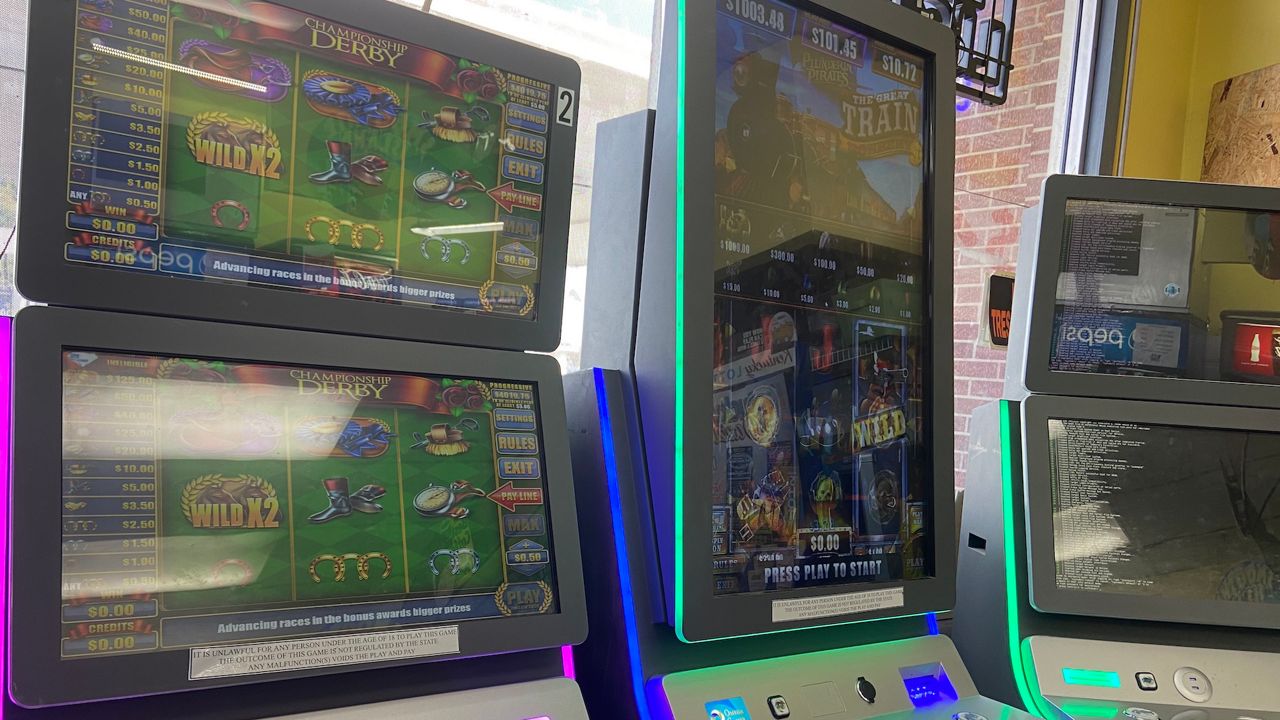LOUISVILLE, Ky. — Just inside the Hurstbourne Food Mart near I-64 in East Louisville, next to the ATM and scratch-off vending machine, sit three big-screen devices that would look at home in a Las Vegas casino.
Despite their appearance, though, these aren’t slot machines. They are what’s known as skill games and they’re cropping up all over Kentucky. They may also soon be illegal.
House Bill 608, which passed the House last week and cleared a Senate committee Tuesday, would ban the increasingly popular games that have spread to hundreds, maybe thousands, of gas stations, convenience stores and bars across the commonwealth.
Supporters of the legislation said the unregulated games are siphoning money away from the Kentucky Lottery and other legal forms of gambling. They said the companies responsible for placing them around the state did not follow proper procedures to do so. Now, they want them gone.
“I think we need to move swiftly and, I think, we need to ban these machines as quickly as we possibly can,” bill sponsor Rep. Killian Timoney, R-Lexington, said on the House floor last week.
It’s not clear how many of the machines, which are also referred to as “gray games” because they operate in a legal gray area, are operating in Kentucky. The Kentucky Lottery tracks those in businesses where it also operates and has found at least 1,504 in 72 counties.
That is of great concern to Mary Harville, President and CEO of Kentucky Lottery Corporation, who told a legislative committee that gray machines are cutting into the lottery’s business.
Every year, the Kentucky Lottery funds hundreds of millions of dollars in scholarships for Kentucky college students. Last fiscal year, the lottery contributed more than $354 million to that cause and Harville said it’s on track to meet its targets this year. But she also had a warning.
“If you don’t take action, you give the gray machines the green light,” she told lawmakers. "And, Kentucky families and Kentucky colleges will not be able to count on the same level of lottery funded scholarships that they’ve come to expect.”
Representatives for Pace-O-Matic, which is behind the “Burning Barrel" skill games in many Kentucky establishments, disputes Harville’s argument. They said there is evidence from other states that the lottery does better in establishments that also have their games on site.
But their primary argument is on behalf of the establishments that welcome them in their doors. Skill games are a “lifeline for small businesses,” said Paul Golding, the president and CEO of Pace-O-Matic.
According to Golding, 40% of the money generated by the machines goes back to the businesses where they’re located. Another 35% goes to the local operators who install and maintain the machines and 25% goes back to the company. Kentucky Lottery retailers receive a 5% commission for the sale of lottery products, with 1% bonuses for winnings tickets cashed and sold.
Fraternal Order of Police (FOP) lodges around the state are also benefiting from skill games.
Recently, Pace-O-Matic donated $150,000 to the Kentucky Fraternal Order of Police (FOP) to fund “the purchase of a truck, trailer, and other equipment to be used by the FOP’s Disaster Area Response Team (DART),” according to a news release.
Ryan Straw, the vice president of FOP, endorsed the machines in a Frankfort committee hearing, saying that fundraising opportunities provided by the devices allows the FOP to take underprivileged children Christmas shopping and sponsor the Special Olympics.
Those who support skill games, he said, are “supporting law enforcement and our veteran service members, along with the small business communities in our commonwealth.”
While Kentucky law bans most forms of gambling, the companies behind these skill games insist they’re not games of chance, but games of skill.
The skills it takes to play them, however, are not high level. In some cases, players begin by hitting a button that spins reels, just as it would on a typical video slot machine. But after the reels stop, players are allowed to “nudge” the results up or down a line to create a winning row of three icons. Other games require players to tap a certain image on the screen to complete a line of winning icons and allow them to repeat a pattern, similar to the children’s toy Simon.
In a video on the Pace-O-Matic website, the company’s national director of compliance, Rick Goodling, says to win the games, “You need memory retention skills, pattern recognition skills, and eye and hand dexterity.”
This is not enough skill for those who argue that the machines run afoul of Kentucky law.
“These machines are illegal,” Senate Republican leader Damon Thayer, R-Georgetown, said in a joint interim committee hearing last year. “I do not want to tax them. I do not want to regulate them. I do not want to make them legal.”
The industry would, in fact, like to see the state regulate the games. Golding, of Pace-O-Matic, and Bob Heleringer, of its competitor Prominent Technologies, both told lawmakers that the companies have no problem paying more taxes. Nor do they object to tighter regulation.
They said the revenue generated from the machines can help the state by pumping millions in tax revenue to the general fund.
“Pending legislation in Pennsylvania right now, taxing this industry at 16%, would give the general fund there $250 million,” Pace-O-Matic lobbyist Jason Underwood told lawmakers. “Last year in Virginia, Pace-O-Matic alone, gave the general fund $140 million.”
But some lawmakers object to where that money would come from. “I’m voting yes to do away the machines that’s going to take away my people’s money back home,” Rep. Chris Fugate, R-Chavies, said last week when the bill passed the House.



